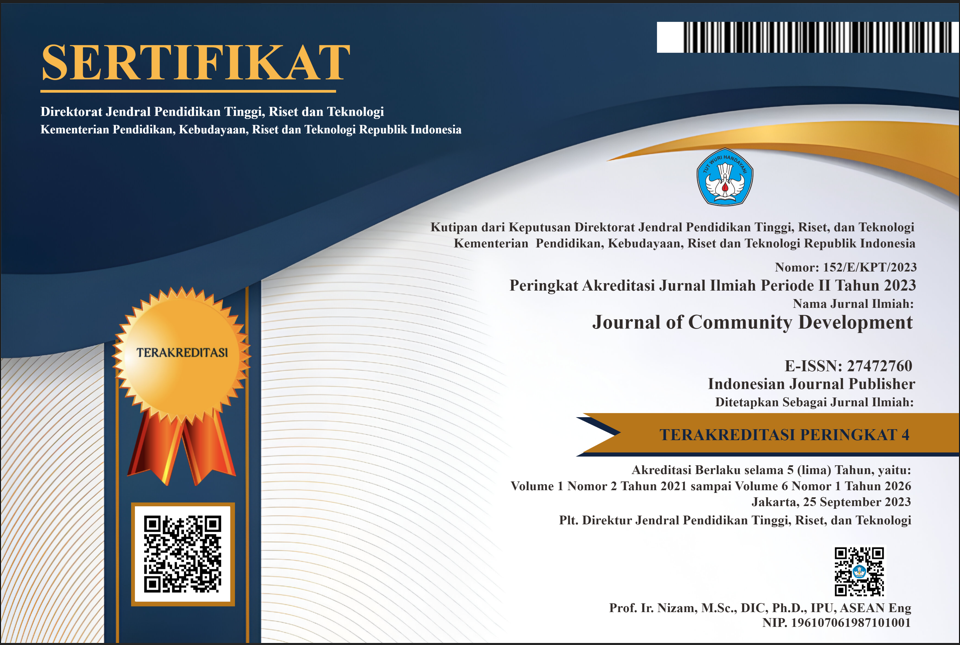Sosialisasi Sistem Jaminan Produk Halal di SMKN 5 Jember
DOI:
https://doi.org/10.47134/comdev.v4i2.136Keywords:
halal, BPJH, food, consumer, productAbstract
Indonesia is a country with the largest Muslim population in the world. This affects the culture and patterns of public consumption of halal and thayyib products. The obligation to consume halal food and thayyib in the sharia review of Muslims is written in the Al Quran and Hadith. Demand for halal products and public awareness of purchasing halal products has increased. This is supported by the Regulation of the Minister of Religion of the Republic of Indonesia No. 26 of 2019 in article 27 which states that products that enter, circulate and trade in the territory of Indonesia must be halal certified. List of products that must be halal certified, in the form of products (food, beverages, medicines, cosmetics, chemical-biological-genetically engineered products, and used goods) and services (slaughter, processing, storage, packaging, distribution, sales and presentation). SMKN 5 Jember is one of the vocational high schools in Jember which has produced processed food products such as bread. In an effort to improve product quality and quality, it is necessary to carry out a halal certification process for bread products from the Halal Product Assurance Organizing Agency (BPJPH). This is a strong reason for academics to evaluate the socialization and mentoring activities carried out for students of SMKN 5 Jember so that they can register bakery products so that they have a halal certificate. The socialization method is carried out using 2 ways, namely lectures and question and answer. The evaluation activity was carried out by giving pre-tests (tests before material explanation) and post-tests (tests after material explanations) to students to measure the effect of socialization on students knowledge of SMKN 5 Jember regarding halal products. Based on the test results it was concluded that the socialization activities carried out were able to increase the knowledge of SMKN 5 Jember students regarding the criteria for halal products. In addition, it is hoped that the existence of halal certification for bakery products at SMKN 5 Jember will become an embryo for the formation of halal food in the school area.
Downloads
References
Ambali, A. R. and Bakar, A. N (2013) ‘Halal Food and Products in Malaysia: People’s Awareness and Policy Implications’ Intellectual Discourse, Vol. 21, No. 1, pp. 7-32.
Azwar D. dan R. Erwanti (2000) ‘Pembuatan Sirup Glukosa Dari Kimpul (Xanthosoma violaceum schott) dengan Hidrolisa Enzimatis. Jurusan Teknik Kimia’ Fak. Teknik, Universitas Diponegoro.
Badan Pusat Statistik (2018) ‘Statistik Tanaman Hortikultura dan Biofarmaka’ Jakarta: Sekretatris Direktorat Jenderal Hortikultura.
Badan Litbang Pertanian (2012) ‘Teknologi Pasca Panen Tanaman Obat’ Balai Besar Penelitian dan Pengembangan Pascapanen Pertanian.
Hasan, K. N. and Sofyan (2014) ‘Kepastian Hukum Sertifikasi dan Labelisasi Halal Produk Pangan’, Jurnal Dinamika Hukum 14(2): 227–38.
Indah (2022) ‘Ini Syarat Daftar Sertifikat Halal Gratis Kategori “Self Declare”’ https://kemenag.go.id/nasional/ini-syarat-daftar-sertifikasi-halal-gratis-kategori-quotself-declarequot-4b6skv (diakses pada tanggal 12 Mei 2023).
Izzudin, Ahmad (2018) ‘Pengaruh Label Halal, Kesadaran Halal, dan Bahan Makanan terhadap minat beli makanan kuliner’ Jurnal Fakultas Ekonomi Universitas Muhammadiyah Jember, Vol. 3 No. 2.
Kantor Desa Bagorejo (2020) ‘Potensi Desa Bagorejo’ Situs Resmi Desa Bagorejo Kecamatan Gumukmas Kabupaten Jember (diakses 15 Mei 2023).
Kementerian Perdagangan (2014) ‘Warta Ekspor’ Jakarta: Direktorat Jenderal Pengembangan Ekspor Nasional Kementerian Perdagangan..
Luthan, S. (2014) ‘Kebijakan Kriminalisasi di Bidang Keuangan’ Yogyakarta: FH UII Press.
Mahanthesh, M.C., et. al. (2013) ‘Morinda citrifolialinn; a medicinal plant with diverse phytochemicals and its medicinal relevance’. World J. Pharm. Res. 3 (1), 215–232.
Nandhasri, Pranee et. al. (2005) ‘Nutraceutical properties of Thai ‘‘Yor’’, Morinda citrifolia and ‘‘Noni’’ juice extract. Songklanakarin’ J. Sci. Technol. 27 (2), 579–586.
Tarigan, Eka Dewi Setia (2016) ‘Pengaruh gaya hidup, label halal dan harga terhadap keputusan pembelian kosmetik wardah pada mahasiswa program studi manajemen fakultas ekonomi Universitas Medan area Medan’ Jurnal Konsep Bisnis dan Manajemen,Vol. 3 No. 1.
The Royal Islamic Strategic Studies Centre (RISSC). (2022) ‘Jumlah Penduduk Muslim Indonesia Terbesar di Dunia pada 2022’ https://dataindonesia.id/ragam/detail/populasi-muslim-indonesia-terbesar-di-dunia-pada-2022 (diakses pada tanggal 19 Mei 2023).
Wilson, J. A. and Liu, J (2011) ‘The Challenges of Islamic Branding: Navigating Emotions and Halal’ Journal of Islamic Marketing, Vol. 2, No. 1, pp. 28-42.
Downloads
Published
How to Cite
License
Copyright (c) 2023 Ara Nugrahayu Nalawati, Danang Kumara Hadi, Oktarina, Alda Wata Alim Ronita, Nanda Putri Eryani

This work is licensed under a Creative Commons Attribution 4.0 International License.







